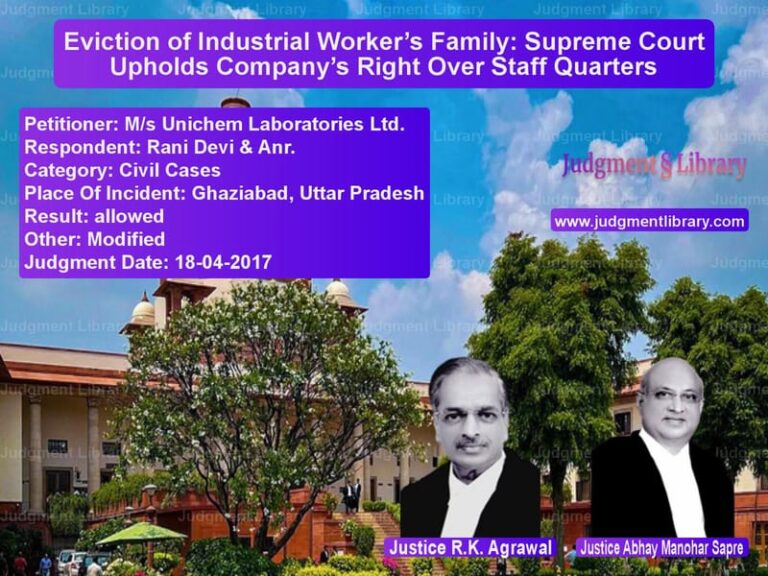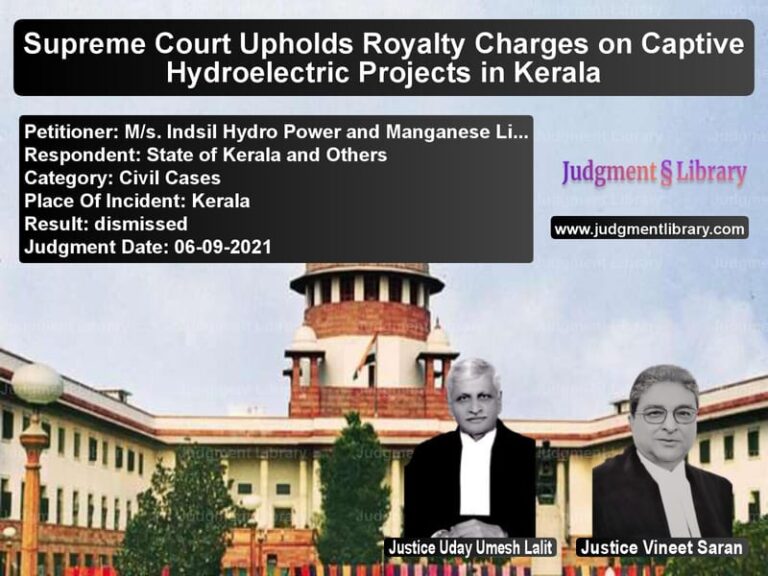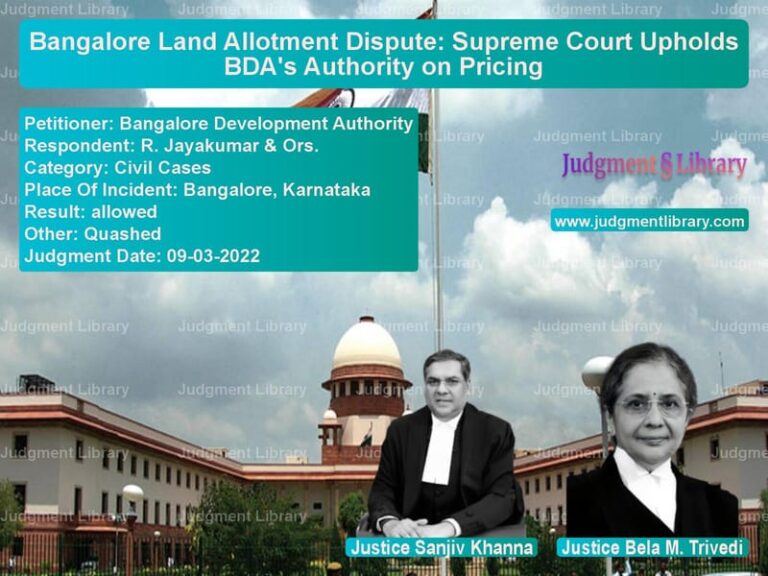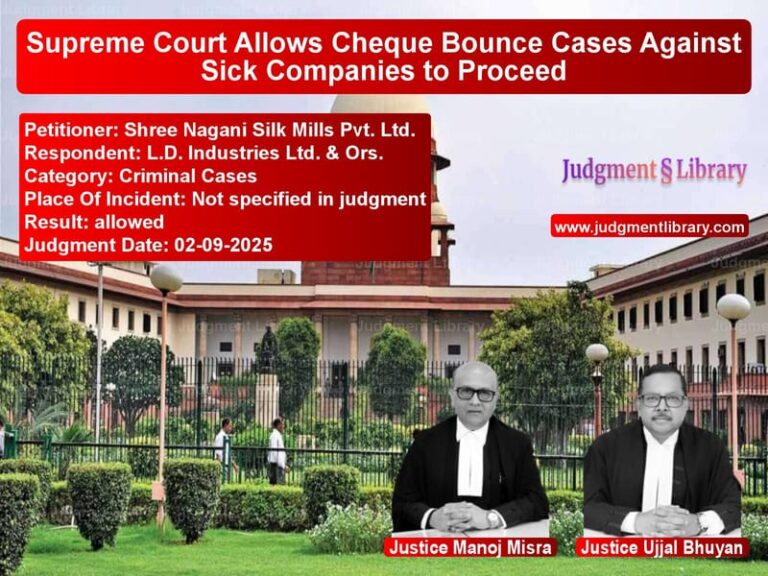S. Vasanthi & Anr. v. M/s Adhiparasakthi Engineering College and Another – Enhancement of Compensation in Motor Accident Case
This case involves an appeal by S. Vasanthi and others (the appellants) against the judgment passed by the High Court of Madras in 2020, which enhanced the compensation awarded to the appellants for the death of their son, S. Sathiyanarayan, in a motor accident. The deceased was riding a motorcycle when it was hit by a bus owned by M/s Adhiparasakthi Engineering College. The trial court had originally awarded compensation based on a notional income of Rs. 7,000 per month, but the High Court, after considering additional arguments, raised the monthly income to Rs. 10,000 and enhanced the compensation to Rs. 16,27,000.
The appellants, aggrieved by the High Court’s decision, filed an appeal before the Supreme Court, seeking a further enhancement of the compensation. They argued that the High Court had not given sufficient weight to the evidence showing that the deceased would have earned significantly more had he survived. Specifically, the appellants presented the case that the deceased, being an MBA student, would have eventually obtained a well-paying job.
Petitioner and Respondent Arguments
Petitioner’s Arguments:
- The appellants, represented by Mr. T. Harish Kumar, argued that both the trial court and the High Court had underestimated the potential earning capacity of the deceased. They emphasized that S. Sathiyanarayan was a graduate in engineering and was pursuing an MBA at the time of the accident, which meant that he was likely to earn a salary similar to his classmates who had already secured high-paying jobs in reputed companies.
- Further, the appellants argued that the compensation should reflect the future earning potential of the deceased, not just the notional income, and they presented evidence in the form of affidavits from the deceased’s classmates, who had secured jobs with salaries ranging from Rs. 39,869 to Rs. 44,588 per month.
- The appellants requested the Court to enhance the notional income to Rs. 42,842 per month, in line with the salary of the deceased’s classmates. They relied on previous judgments, including *Kurvan Ansari v. Shyam Kishore Murmu* (2022) 1 SCC 317, to support their claim for a higher compensation.
Respondent’s Arguments:
- The respondents, represented by Mr. A.K. De, argued that both the trial court and the High Court had correctly assessed the notional income, considering the fact that the deceased was still a student at the time of his death and had not yet started working. They contended that since the deceased was only in the second year of his MBA program, the compensation for future earnings should be calculated based on his status as a student, not as a working professional.
- The respondents maintained that the appellants’ claim for an enhancement of the monthly income to Rs. 42,842 was speculative and lacked sufficient basis. They argued that the High Court’s decision to enhance the income to Rs. 10,000 per month was reasonable and in line with similar cases where the deceased was not employed at the time of death.
Key Issues and Supreme Court’s Ruling
The Supreme Court addressed the following key issues in this case:
1. Determining the Notional Income of the Deceased
The Court examined whether the notional income of the deceased, as calculated by the High Court at Rs. 10,000 per month, was appropriate given the deceased’s educational background and potential future earning capacity. The Court noted that the deceased had been an engineering graduate and was pursuing an MBA, which would have enabled him to secure a well-paying job had he survived. The Court also considered the affidavits filed by the appellants, which showed that the deceased’s classmates had secured jobs with salaries between Rs. 39,869 and Rs. 44,588 per month.
The Court concluded that the High Court had not given sufficient weight to the evidence regarding the deceased’s future prospects. The Court, therefore, enhanced the monthly notional income of the deceased to Rs. 30,000 per month, based on the reasonable assumption that the deceased would have been employed in a high-paying job upon completing his education.
2. The Calculation of Compensation for Loss of Dependency
The Court then focused on the calculation of compensation for loss of dependency. The Court applied a 40% increase to the notional income to account for future prospects, resulting in a monthly income of Rs. 42,000. The Court further deducted 50% of the monthly income to account for the personal and living expenses of the deceased, resulting in a monthly loss of dependency of Rs. 21,000.
For the annual loss of dependency, the Court multiplied the monthly loss by 12, resulting in a yearly loss of Rs. 2,52,000. The Court applied a multiplier of 18, resulting in a total loss of dependency of Rs. 45,36,000.
3. Compensation for Other Heads
The Court also awarded compensation under various heads, including loss of consortium (Rs. 40,000), funeral expenses (Rs. 30,000), loss of estate (Rs. 15,000), and transportation expenses (Rs. 5,000). The total compensation was calculated as Rs. 46,11,000, which included the loss of dependency and the additional compensation under the various heads.
4. Enhancement of Compensation
The Court found that the compensation awarded by the High Court was insufficient to adequately compensate the appellants for the loss of their only son. The Court enhanced the compensation to Rs. 46,11,000, which was an increase of Rs. 29,84,000 over the amount awarded by the High Court. The Court also directed that the enhanced compensation be paid to the appellants with interest at the rate of 7.5% per annum, effective from the date of the judgment.
Conclusion
The Supreme Court allowed the appeal and enhanced the compensation to Rs. 46,11,000. The Court held that the High Court had erred in calculating the notional income of the deceased and failed to give adequate weight to the evidence regarding the deceased’s future earning potential. The Court also directed the respondents to pay the enhanced compensation along with interest at the rate of 7.5% per annum within three months.
This ruling reaffirms the importance of considering future prospects when calculating compensation in motor accident cases, particularly when the deceased was a student or young professional with significant potential. The decision also underscores the Court’s commitment to ensuring that families who lose their loved ones in accidents receive just compensation for their loss.
Impact and Implications
This case has significant implications for the calculation of compensation in motor accident claims, especially when the deceased is a student or young professional. The ruling clarifies how future earning potential should be factored into the calculation of compensation, ensuring that the financial loss to the family is accurately reflected. The decision also highlights the importance of fair compensation for loss of consortium, funeral expenses, and other related costs.
Petitioner Name: S. Vasanthi.Respondent Name: M/s Adhiparasakthi Engineering College.Judgment By: Justice B.R. Gavai, Justice C.T. Ravikumar.Place Of Incident: Madras.Judgment Date: 11-10-2022.
Don’t miss out on the full details! Download the complete judgment in PDF format below and gain valuable insights instantly!
Download Judgment: s.-vasanthi-vs-ms-adhiparasakthi-e-supreme-court-of-india-judgment-dated-11-10-2022.pdf
Directly Download Judgment: Directly download this Judgment
See all petitions in Road Accident Cases
See all petitions in Compensation Disputes
See all petitions in Motor Vehicle Act
See all petitions in Negligence Claims
See all petitions in Judgment by B R Gavai
See all petitions in Judgment by C.T. Ravikumar
See all petitions in allowed
See all petitions in supreme court of India judgments October 2022
See all petitions in 2022 judgments
See all posts in Accident Cases Category
See all allowed petitions in Accident Cases Category
See all Dismissed petitions in Accident Cases Category
See all partially allowed petitions in Accident Cases Category







